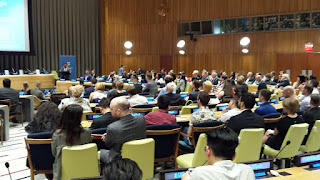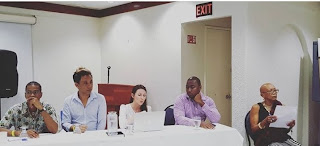Redefining marriage
Redefining marriage
The
US Supreme Court’s decision to strike down key provisions of the
Defence of Marriage Act has been hailed as a landmark moment for gay
rights in America. A more realistic assessment would note that same-sex
marriage is still banned or unavailable in 37 American states and
considerable legal hurdles remain if the definition of marriage is to be
taken out from the control of individual states as Roe v Wade did with
abortion rights. The implacable defence of “traditional marriage” by
Christian groups within the United States has made the ruling an
important skirmish within America’s ever-strident culture wars, but it
is far from an outright victory.
During the last twelve months six American states have legalized same-sex marriage, bringing the total to 12 prior to the present squabble, initially over California’s Proposition 8. That particular battle has now been resolved with the court’s decision to rule in favour of same-sex unions. Further afield there has been a comparable shift in public opinion. Already legal in 11 countries (among them Argentina, Canada, Denmark and the Netherlands) gay marriage is being legalized with increasing frequency in many parts of the world. This year alone Brazil and France legalized same-sex unions, and New Zealand and Uruguay are poised to enact similar legislation. A month from now, more than half a billion people will reside in jurisdictions that recognize same-sex marriage, more than twice the number just a year ago.
For practical purposes the DoMA decision means that same-sex couples who are legally married, according to the laws of their states, are entitled to non-discriminatory treatment from the federal government. The decision is particularly important, and long overdue, with respect to benefits like Social Security and veterans’ payments. In the past, various federal agencies used different criteria to assess whether a same-sex marriage was “valid.” These inconsistencies have been swept aside in the latest ruling, but the court refrained — significantly — from defining same-sex marriage as a constitutional right. That omission has heartened Christian groups throughout America.
Beyond the narrow legal reasoning in the current Supreme Court decision, however, there is an acknowledgement that the defence of “traditional marriage” has increasingly been used to stigmatize same-sex couples. The disgraceful marginalization of gay soldiers is but one aspect of this discrimination. In a significant passage in the majority opinion (in the 5-4 decision), Justice Kennedy writes that “[t]he avowed purpose and practical effect of the law here in question are to impose a disadvantage, a separate status, and so a stigma upon all who enter into same-sex marriages made lawful by the unquestioned authority of the States.”
Kennedy’s language echoes earlier civil rights phrasing, in Brown v Board of Education (1954), which, among other things, refuted the ridiculous notion that black and white schools were “separate but equal” and it also harks back to the less well-known 1967 decision in Loving v Virginia, a case that invalidated laws prohibiting inter-racial marriage. Observers outside the United States should note how recent these civil rights victories were. It should give pause to everyone in a culturally diverse region like the Caribbean that almost 50 years ago the state of Virginia was legally permitted to jail a white man for the crime of marrying a black woman. Those who argue that “traditional marriage” cannot be easily redefined should think carefully about this case before making sweeping assertions. Contemporary opposition to same-sex unions will almost certainly appear as shortsighted and demeaning to future American citizens as the pre-Loving prejudices seem to us today.
The Caribbean has always been, and largely remains, vociferously opposed to the acknowledgement of same-sex intimacy. If nothing else the recent US debates over the issue have shown how backward so many of our prevailing attitudes on these matters really are. Nobody who has lived in a tolerant country would ever wish to turn back the clock, especially when they see – as they inevitably do – the freedom such tolerance brings to the lives of gay friends and family members who would otherwise live in unbearable secrecy.
Same-sex marriage, at this stage, is probably a bridge too far, but civilized tolerance is certainly within our grasp. Local groups like the Equal Rights Trust and the Society against Sexual Orientation Discrimination have clearly shown the inconsistency between our current anti-discrimination laws and others which criminalize “same-sex intimacy between men and cross-dressing by both men and women.” It is high time that civil society had an honest conversation about these incendiary issues, and set about resolving them.
Source:http://www.stabroeknews.com/2013/opinion/editorial/06/29/redefining-marriage/
During the last twelve months six American states have legalized same-sex marriage, bringing the total to 12 prior to the present squabble, initially over California’s Proposition 8. That particular battle has now been resolved with the court’s decision to rule in favour of same-sex unions. Further afield there has been a comparable shift in public opinion. Already legal in 11 countries (among them Argentina, Canada, Denmark and the Netherlands) gay marriage is being legalized with increasing frequency in many parts of the world. This year alone Brazil and France legalized same-sex unions, and New Zealand and Uruguay are poised to enact similar legislation. A month from now, more than half a billion people will reside in jurisdictions that recognize same-sex marriage, more than twice the number just a year ago.
For practical purposes the DoMA decision means that same-sex couples who are legally married, according to the laws of their states, are entitled to non-discriminatory treatment from the federal government. The decision is particularly important, and long overdue, with respect to benefits like Social Security and veterans’ payments. In the past, various federal agencies used different criteria to assess whether a same-sex marriage was “valid.” These inconsistencies have been swept aside in the latest ruling, but the court refrained — significantly — from defining same-sex marriage as a constitutional right. That omission has heartened Christian groups throughout America.
Beyond the narrow legal reasoning in the current Supreme Court decision, however, there is an acknowledgement that the defence of “traditional marriage” has increasingly been used to stigmatize same-sex couples. The disgraceful marginalization of gay soldiers is but one aspect of this discrimination. In a significant passage in the majority opinion (in the 5-4 decision), Justice Kennedy writes that “[t]he avowed purpose and practical effect of the law here in question are to impose a disadvantage, a separate status, and so a stigma upon all who enter into same-sex marriages made lawful by the unquestioned authority of the States.”
Kennedy’s language echoes earlier civil rights phrasing, in Brown v Board of Education (1954), which, among other things, refuted the ridiculous notion that black and white schools were “separate but equal” and it also harks back to the less well-known 1967 decision in Loving v Virginia, a case that invalidated laws prohibiting inter-racial marriage. Observers outside the United States should note how recent these civil rights victories were. It should give pause to everyone in a culturally diverse region like the Caribbean that almost 50 years ago the state of Virginia was legally permitted to jail a white man for the crime of marrying a black woman. Those who argue that “traditional marriage” cannot be easily redefined should think carefully about this case before making sweeping assertions. Contemporary opposition to same-sex unions will almost certainly appear as shortsighted and demeaning to future American citizens as the pre-Loving prejudices seem to us today.
The Caribbean has always been, and largely remains, vociferously opposed to the acknowledgement of same-sex intimacy. If nothing else the recent US debates over the issue have shown how backward so many of our prevailing attitudes on these matters really are. Nobody who has lived in a tolerant country would ever wish to turn back the clock, especially when they see – as they inevitably do – the freedom such tolerance brings to the lives of gay friends and family members who would otherwise live in unbearable secrecy.
Same-sex marriage, at this stage, is probably a bridge too far, but civilized tolerance is certainly within our grasp. Local groups like the Equal Rights Trust and the Society against Sexual Orientation Discrimination have clearly shown the inconsistency between our current anti-discrimination laws and others which criminalize “same-sex intimacy between men and cross-dressing by both men and women.” It is high time that civil society had an honest conversation about these incendiary issues, and set about resolving them.
Source:http://www.stabroeknews.com/2013/opinion/editorial/06/29/redefining-marriage/



Comments
Post a Comment